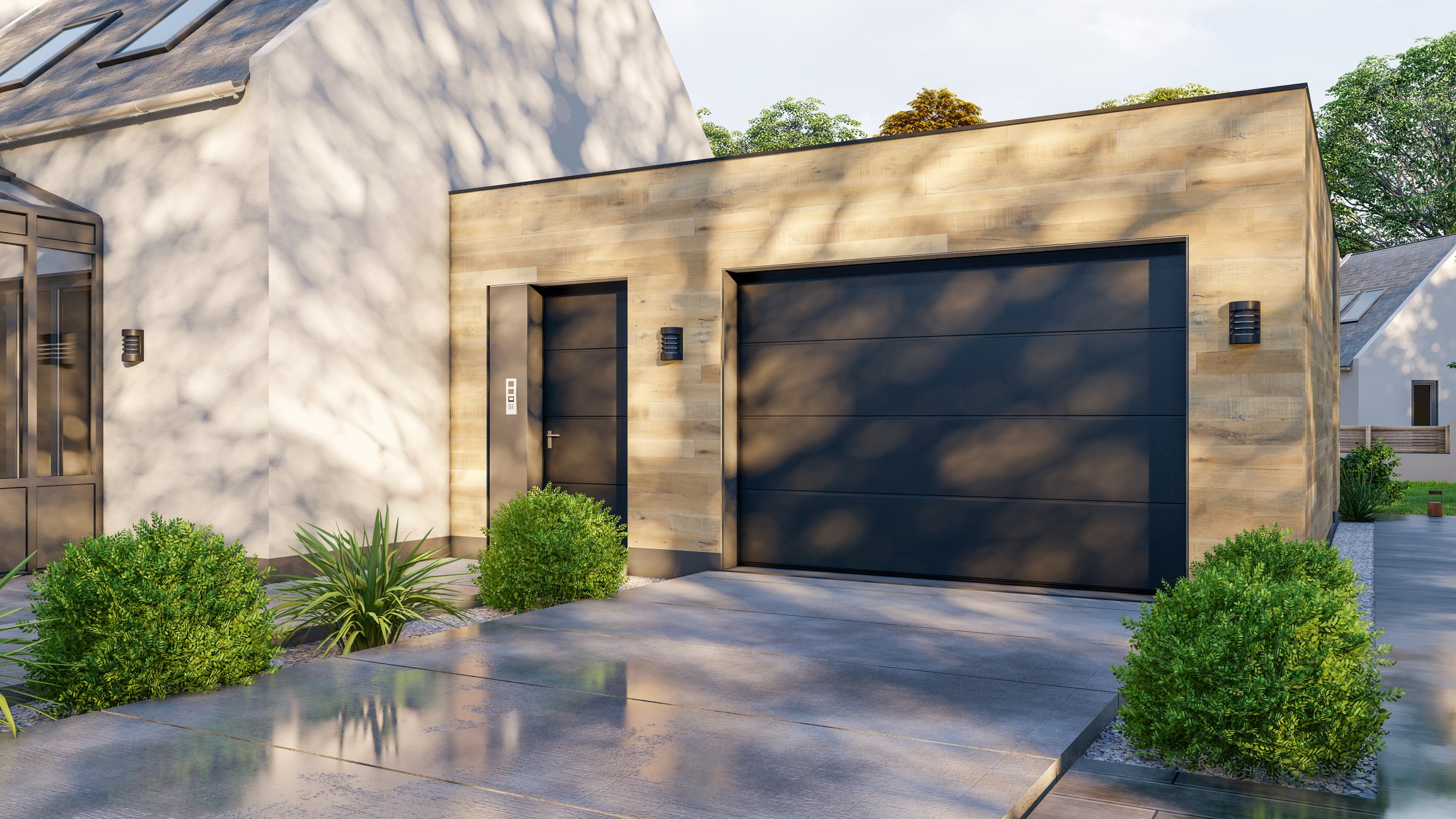Replacing the garage door can make your home more energy efficient, add curb appeal, and potentially increase its value. Garage door replacement costs depend on factors like size, style, materials and other features.
How much does a garage door cost in Canada?
| Type of garage door | Typical replacement cost |
|---|---|
| Traditional | $1,000 to $5,000 |
| Coach/carriage house | $1,800 to $10,000 |
| Modern | $3,000 to $10,000 |
Price ranges reflect averages source from sites like Calgary Door Fix[1], BC Garage Doors[2], HomeStars[3], HomeDepot.ca[4] and RenoAssistance[5]. Your actual garage door replacement costs may vary.
Factors that affect the cost of a garage door
Garage door costs can vary quite a bit since they come in both prefabricated and custom sizes. The many different customization options, like colours, materials and windows, will also affect your overall costs.
As a result, businesses that specialize in garage doors frequently use quote-based pricing instead of flat rates. Large hardware stores often have specific pricing available online, but these websites may fail to capture all the nuances of your particular project.
Style
There are three main styles of garage doors, and each comes with a different price tag:
- Traditional. These doors are the most common style for homes in Canada. They’re square or rectangular and are also the most affordable. Although you have some customization options, they’re pretty basic.
- Coach house. Sometimes referred to as carriage house doors, coach house doors have a classic look and are a similar price to traditional garage doors. Some customization options include long panels, recessed panels and shaker designs.
- Modern or contemporary. Homeowners aiming for a sleek look may be interested in modern or contemporary garage doors, which can fit well with newer home designs and can increase curb appeal. The trade-off is that modern garage doors are usually more expensive than other styles.
Size
Single-car garage doors (8 to 9 feet wide and 7 to 8 feet high) are usually cheaper than double-car garage doors (16 feet wide and 7 to 8 feet high), but prices vary depending on the size and configuration of your garage.
For example, if you want two single-car garage doors as opposed to one double-car door, your costs may be higher, especially if you factor in the potential purchase of an additional garage door opener and the ongoing maintenance that comes with two individual doors.
If your garage requires custom-sized doors instead of standard double or single doors, the price can also increase.
Another thing to keep in mind is that larger or heavier doors may require more power to lift, which would increase your overall costs since you’ll need a more powerful garage door opener.
Materials
In addition to choices about the size and style of your garage doors, you can also choose from different materials — all of which will affect your budget:
- Steel. The most common material for garage doors is steel. Although it’s a budget-friendly material, it’s still quite durable, though it may be susceptible to rust.
- Fibreglass. Unlike steel, fibreglass doesn’t rust. However, fibreglass garage doors can cost a lot more than other options.
- Wood. Some homeowners prefer wooden garage doors because they offer a classic look. That said, wooden doors require more maintenance and can warp.
- Composite or faux wood. Composite garage doors offer the look of wood, but at a lower price and without the need for as much maintenance. They’re durable, moisture-resistant options that won’t warp over time.
Extra features
It’s possible to customize your garage doors with extra features, such as window inserts, insulation and glass panels, but each customization will affect the cost. Don’t underestimate the value of insulation, though — it could help you convert your garage into a more useful year-round space, and it may even reduce your monthly energy costs.
Other garage door costs to consider
In addition to the cost of the new garage door itself, there are a few additional elements that are worth considering as part of your overall budget.
Warranty
A new garage door often comes with a short warranty — such as one year — on the parts and labour, though some installers offer longer warranties. If you’re interested in an extended warranty, ask your garage door installer for a quote.
Garage door opening system
Unless you plan on opening your garage manually each time, you’re going to need to purchase a garage door opener. An opening system may not be included in your door installation quote unless specifically requested.
Various types of garage door openers are available, including chain drive, belt drive and direct drive systems. Each comes with a different price point, with chain drive openers generally being among the least expensive options and direct drive openers generally being among the most expensive.
Many garage door openers also offer features like the ability to check and control the door from your smartphone.
Security system integration
If you’re looking for added security, you can get your garage door installer to add an enhanced lock or a keypad to your garage door. You could also potentially integrate it into your existing home security system. You can pay for professional installation of such security features or buy a kit online and go the DIY route to save on setup costs.
Maintenance
In most cases, annual maintenance costs for your garage door will be fairly low. You’ll mainly want to make sure the door is clean and the moving parts of the garage door opener are lubricated. Your garage door opener’s batteries and lightbulbs may also need to be replaced every couple of years.
Location
Where you live can impact the cost of your garage door. If you live in a rural area, or an area where a lot of homes are being built, there may be fewer installers available when you need one. In addition, any extra transportation time or special requests may increase your costs.
Benefits of installing a new garage door
Many homeowners only think about replacing their garage door when the existing one is damaged. However, upgrading your garage door earlier may be worth your while if you consider these benefits.
Curb appeal
If your existing garage door is decades old, a new one can quickly update your home’s look. Choosing a more modern style or a bold colour can instantly make your home stand out.
Energy efficiency
Many homes lose heat through the garage, especially if the door is often left open. When closed, a new insulated garage door may retain more heat, which can potentially decrease your monthly energy bills. The decrease might not be dramatic, but it can still help make your home more energy efficient.
Additional living space
Some homeowners think of their garage strictly as a place to park their car or store tools and gear, but a new garage door can change this perception. A new insulated door and an added heater can turn your garage into a liveable space used as a gym, games room, workshop and more.
Home value
A new garage door may increase the value of your home. People looking to buy a home will typically compare similar properties on the market. If your home has a new garage door and other similar properties don’t, your home may be more appealing and may command a higher home appraisal.
Increased safety
Replacing an older garage door and opener can improve safety. New garage door openers are required to have safety sensors that keep the door from closing if anything is in its way. This prevents injuries to pets and children, as well as damage to vehicles, tools and the door itself.
Frequently asked questions about garage door replacement costs
If your garage door is made of multiple panels, it may be possible to replace just one if it’s been damaged. A single-panel replacement is usually less expensive than a new garage door, so it’s a great option if the damage is limited to one panel. A garage door professional can help you determine whether a repair or replacement is the right choice.
Costs vary based on the type of garage door opener and the provider. Chain drive garage openers can cost anywhere from around $250-$400, plus installation costs. A belt drive garage opener is quieter and typically costs $350-$700. Wall-mounted direct drive garage openers can cost around $550-$900. Some openers can connect to your WiFi network, which lets you control it from your mobile device.
Article Sources
-
Calgary Garage Door Fix, “Garage Door Repair Cost Calgary,” accessed July 10, 2024.
-
BC Garage Doors, “Carriage House Garage Door,” accessed July 10, 2024.
-
HomeStars, “Garage Door Cost Toronto,” accessed July 10, 2024.
-
HomeDepot.ca, “How Much Does a Garage Door Cost to Install?,” accessed July 10, 2024.
-
RenoAssistance, “Door Replacement Costs,” accessed July 10, 2024.
DIVE EVEN DEEPER

Home Improvement Project? 5 Questions to Ask Before You DIY
Before deciding that you’ll DIY, consider the time, expertise and costs involved to complete your project — and how you’ll pay for it.

The Greener Homes Grant and Other Money-Saving Programs for Homeowners
Canada’s Greener Home Grant is just one of many programs and incentives that can help you pay for upgrades and retrofits that make your home more efficient.

HELOC vs Personal Loan: How to Choose
A HELOC is a type of revolving credit available to homeowners with ample equity, while a personal loan is a fixed-sum financing option available to all qualified borrowers.


